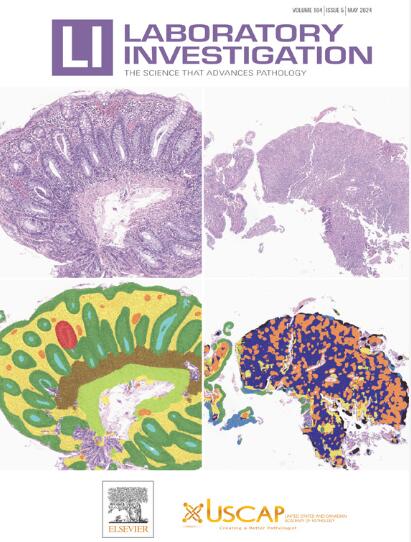溃疡性结肠炎患者的炎症肠上皮细胞在体外扩增后恢复非炎症转录谱
IF 5.1
2区 医学
Q1 MEDICINE, RESEARCH & EXPERIMENTAL
引用次数: 0
摘要
溃疡性结肠炎(UC)的特点是慢性复发性炎症,从直肠和结肠远端开始,严重时可影响整个结肠。直接从溃疡性结肠炎结肠组织标本中分离的肠干细胞(ISCs)已被发现具有炎症基因表达谱。然而,一个关键的问题是这些细胞是否保留了暴露于炎症和/或治疗的记忆。在这里,我们的目的是研究人肠上皮细胞在体外作为3D培养的类器官扩增时是否保留体内观察到的炎症状态,以评估其用于治疗性移植的适用性。从非炎症性肠病对照(非炎症性;n = 18),以及从诊断为UC(炎症)的个体中获得的乙状结肠结肠镜活检,糖皮质激素naïve (n = 19)。此外,收集了所有接受强的松龙治疗的炎症性肠病患者的ISCs。上皮细胞在培养基中培养成三维肠道类器官,以支持干细胞的维持和分化。随后,在传代2结束时收获3D肠道类器官进行批量RNA测序。数据显示,从炎症组织中分离的体外培养上皮细胞的细胞表型不保持在最初获得细胞的溃疡环境中观察到的炎症特征。我们的研究结果表明,在UC的活动性阶段,自体重新插入体外扩展的ISCs可能有助于肠道愈合,这需要进一步的临床研究。此外,类器官形态与原始组织的炎症状态之间的联系被确定,因为来自炎症结肠的类器官表现出较低程度的圆形。本文章由计算机程序翻译,如有差异,请以英文原文为准。
Inflamed Intestinal Epithelial Cells From Patients With Ulcerative Colitis Restore a Noninflamed Transcriptional Profile Upon In Vitro Expansion
Ulcerative colitis (UC) is characterized by chronic relapsing inflammation starting from the rectum and distal colon, which in severe disease cases may affect the entire colon. Intestinal stem cells (ISCs) directly isolated from inflamed UC colonic tissue specimens have been found to present an inflammatory gene expression profile. However, a critical issue is whether these cells retain memory of exposure to inflammation and/or therapeutics. Here, we aimed to investigate whether human intestinal epithelial cells retain the inflammatory state observed in vivo when expanded in vitro as 3D cultured organoids to assess their suitability for therapeutic transplantation. ISCs were isolated from noninflammatory bowel disease controls (noninflamed; n = 18), as well as from colonoscopy-obtained biopsies of the sigmoid colon from individuals diagnosed with UC (inflamed), who were glucocorticoid naïve (n = 19). Moreover, ISCs were collected from all patients with inflammatory bowel disease following prednisolone treatment. Epithelial cells were cultured as 3D intestinal organoids in media to support stem cell maintenance and differentiation. Subsequently, the 3D intestinal organoids were harvested at the end of passage 2 for bulk RNA sequencing. The data revealed that the cellular phenotype of in vitro–cultured epithelial cells isolated from inflamed tissue did not maintain the hallmarks of inflammation observed in the ulcerated environment from which the cells were initially obtained. Our findings indicate that the autologous reinsertion of in vitro–expanded ISCs in active stages of UC may aid in intestinal healing, which calls for future clinical studies. Additionally, a link between organoid morphology and the inflammatory state of the tissue of origin was identified, as organoids derived from inflamed colon exhibited a lower degree of circularity.
求助全文
通过发布文献求助,成功后即可免费获取论文全文。
去求助
来源期刊

Laboratory Investigation
医学-病理学
CiteScore
8.30
自引率
0.00%
发文量
125
审稿时长
2 months
期刊介绍:
Laboratory Investigation is an international journal owned by the United States and Canadian Academy of Pathology. Laboratory Investigation offers prompt publication of high-quality original research in all biomedical disciplines relating to the understanding of human disease and the application of new methods to the diagnosis of disease. Both human and experimental studies are welcome.
 求助内容:
求助内容: 应助结果提醒方式:
应助结果提醒方式:


